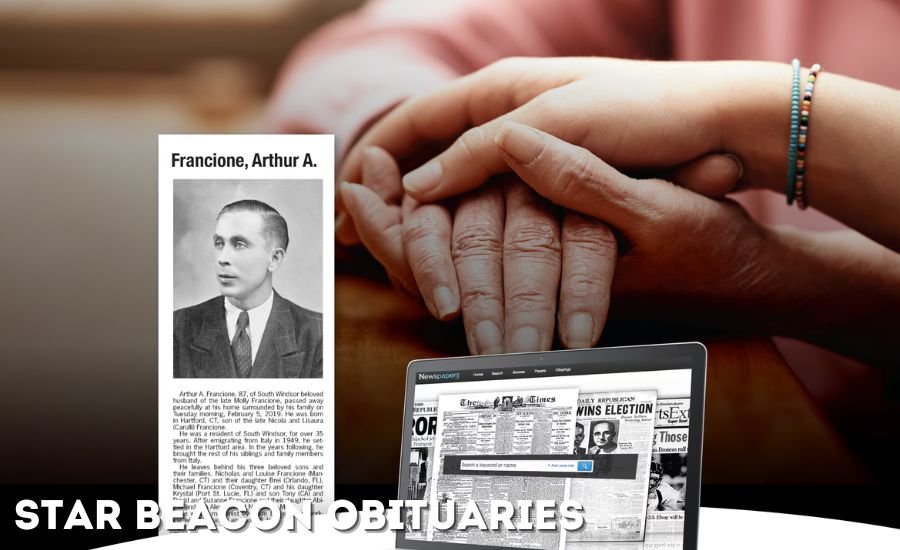Understanding the Star Beacon Obituaries: A Guide to Honoring Lives

Obituaries are more than just announcements of death; they are heartfelt tributes celebrating the lives of those who have passed away. They provide a glimpse into the life of the deceased, highlighting their achievements, passions, and the impact they had on family and friends. A critical resource for finding local obituaries is the Star Beacon, a publication that has served the community for many years. This guide aims to help you understand the significance of obituaries, how to find them in the Star Beacon, and even how to write your own.
What Are Obituaries?
Obituaries are written notices that inform the public about a person’s death. They typically include essential information such as the deceased’s name, age, date of death, and details about their life. The primary purpose of an obituary is to honor the memory of the individual and to inform the community about funeral arrangements.
The Purpose of Obituaries
The purpose of obituaries extends beyond simply announcing a death. They serve several functions:
- Commemoration: Obituaries provide an opportunity for families to commemorate the life of their loved ones. They celebrate individual achievements and contributions, ensuring the community remembers the deceased positively.
- Information Sharing: Obituaries inform the public about funeral services and memorials, helping to gather friends and family to honor the deceased.
- Grief Processing: Writing and reading obituaries can be an essential part of the grieving process, allowing families to express their sorrow and share cherished memories.
- Cultural Tradition: In many cultures, obituaries are an essential part of mourning rituals, helping communities come together to pay their respects.
Different Styles of Obituaries
Obituaries can vary in style and tone, depending on the family’s preferences. Some obituaries are formal and traditional, while others may have a more personal or humorous touch. For example, a family may choose to highlight a loved one’s sense of humor or their hobbies, such as gardening or fishing, which can provide a more rounded view of their personality.
The Role of the Star Beacon in Obituaries
The Star Beacon is a reputable source of local news and information, and its obituary section is an essential part of its offerings. Established as a community newspaper, the Star Beacon has a rich history of connecting residents and providing them with relevant information, including obituaries.
Historical Significance
The Star Beacon has served the Ashtabula community for decades, documenting local events, achievements, and losses. This newspaper has become a trusted source for residents, creating a historical archive of the community’s narrative through its publications.
Community Connection
For many families in the area, the Star Beacon is a trusted platform for sharing the news of their loved one’s passing. By publishing obituaries, the newspaper helps families reach out to their community, ensuring that friends, neighbors, and colleagues can honor the deceased’s life.
How to Find Obituaries in the Star Beacon
Locating obituaries in the Star Beacon is simple. Here’s a step-by-step guide to help you access this valuable resource:
- Visit the Star Beacon website: Start by going to the official Star Beacon website. This is where you’ll find the most up-to-date information on obituaries.
- Navigate to the Obituaries section: Look for the “Obituaries” tab on the homepage. This section typically features the latest obituaries published.
- Search by name or date: You can search for a specific person by typing their name into the search bar. Alternatively, you can browse obituaries by date to find recent notices.
- Read the full obituary: Click on the deceased’s name to read the full obituary, which provides more details about their life, family, and funeral arrangements.
- Use social media: Sometimes, families share obituary links on social media platforms, so keeping an eye on community pages may also help you find the information.
Following these steps, you can easily find obituaries in the Star Beacon and stay connected with your community during difficult times.
Understanding the Structure of an Obituary
An obituary usually contains several key elements that help convey the life story of the deceased. Here’s a breakdown of the standard components:
- Full Name: The complete name of the individual, including any nicknames they may have been known by.
- Dates: The birth date and date of death are often expressed in a format like “January 1, 1950 – January 1, 2024.”
- Family Information: Names of immediate family members, including parents, siblings, children, and spouses, often indicating relationships (e.g., “survived by”).
- Life Achievements: A brief overview of the person’s life, including significant milestones, career accomplishments, hobbies, and interests.
- Funeral Arrangements: Details about the memorial service or funeral, including the date, time, and location, along with any specific requests, such as donations to a charity.
Understanding these components can help readers appreciate the richness of each person’s life as shared through their obituary.
Example Structure of an Obituary
Here’s how the different elements fit together in a typical obituary:
- Name: John Doe
- Age: 75
- Date of Death: October 15, 2024
- Birth Information: Born on March 1, 1949, in Ashtabula, Ohio.
- Family Information: Survived by his wife, Jane Doe; children, Mike and Sarah; and grandchildren.
Sample Obituary
John Doe, age 75, of Ashtabula, Ohio, passed away on October 15, 2024. He was born on March 1, 1949, in Ashtabula. He is survived by his wife, Jane Doe; his children, Mike and Sarah; and his beloved grandchildren.
John was a dedicated teacher and a passionate gardener. He loved spending time with his family, sharing stories of his travels, and cultivating beautiful flowers in his backyard.
A memorial service will be held on October 20, 2024, at 2 PM at the Ashtabula Community Center. Instead of flowers, donations may be made to the Ashtabula Community Garden.
Tips for Writing an Obituary
Writing an obituary can feel overwhelming, especially during a time of grief. However, it can also be a meaningful way to honor a loved one’s memory. Here are some helpful tips for crafting a heartfelt obituary:
- Start with the basics: Begin with the full name, age, and date of death. This ensures the essential information is clear from the start.
- Share personal stories: Include anecdotes or stories that reflect the person’s character, passions, and values. This personal touch can make the obituary more memorable.
- Be inclusive: Mention all immediate family members, recognizing their relationships with the deceased. This acknowledgment can bring comfort to the family during their time of loss.
- Keep it concise: While it’s essential to share meaningful details, strive for clarity and brevity. Aim for a length that captures the person’s essence without overwhelming the reader.
- Proofread: Before submitting the obituary, review it for any spelling or grammatical errors. A well-written tribute is a respectful way to honor the deceased.
Common Mistakes to Avoid
When writing an obituary, it’s essential to avoid certain pitfalls, such as:
- Overly Formal Language: While it’s necessary to maintain respect, an overly formal tone can make the obituary feel impersonal. Aim for a warm, conversational tone that reflects the deceased’s personality.
- Neglecting Important Details: Make sure to include all relevant information, such as the time and place of the memorial service.
- Excessive Length: While sharing stories is essential, be careful not to write a lengthy narrative. A concise yet meaningful tribute is often more impactful.
You May Also Like: Baca-Funeral-Home-Obituaries-Las-Cruces
The Emotional Impact of Obituaries
Obituaries play a significant role in the grieving process. They not only serve as an announcement of death but also provide a means for families and friends to share their grief publicly. Reading an obituary can evoke memories and emotions, reminding individuals of their relationships and experiences with the deceased.
Healing through Memory
For many, an obituary offers comfort in knowing that others are mourning alongside them. It can also serve as a space for reflection, allowing loved ones to celebrate the deceased’s life and contributions while processing their own feelings of loss.
The act of writing and sharing an obituary can be therapeutic for families. It allows them to reflect on the happy moments they shared with the deceased, providing a form of closure as they process their grief.
The Community’s Role
In a small town like Ashtabula, community support can be invaluable. Obituaries shared in local newspapers like the Star Beacon help foster a sense of togetherness. When friends and neighbors read an obituary, they are reminded of the shared experiences and connections within the community, creating a network of support during difficult times.
Conclusion
Obituaries are vital for honoring the lives of those who have passed away. They offer a way to reflect on a person’s life, celebrate their achievements, and share memories with the community. The Star Beacon is an invaluable resource for those looking to connect with their community during difficult times.
By understanding the structure of an obituary, learning how to find it, and knowing how to write one, you can contribute to the meaningful tradition of remembering and celebrating lives. Use this guide to navigate the world of obituaries and to honor the memories of loved ones with grace and respect.
FAQs
Q: What is the purpose of an obituary?
A: An obituary serves to announce a person’s death, celebrate their life, and provide information about funeral services.
Q: How can obituaries help in the grieving process?
A: Obituaries allow friends and family to share their grief and memories publicly, fostering a sense of community support.
Q: Can obituaries be published online?
A: Yes, many newspapers, including the Star Beacon, publish obituaries online for broader access.
Q: Is it common for obituaries to be shared on social media?
A: Yes, many families share obituaries on social media platforms to reach a wider audience and inform friends and family about memorial services.
Q: How can I submit an obituary to the Star Beacon?
A: Families can usually submit an obituary through the Star Beacon’s website or by contacting their office directly. Be sure to include all necessary information and any specific requests for publication.
Q: Are obituaries only for adults?
A: No, obituaries can be written for individuals of all ages, including children and infants. Each life is valuable and deserves to be honored.
Q: Can I write an obituary for someone who did not pass away recently?
A: Yes, you can write obituaries for individuals regardless of when they passed away. It can be a way to honor their memory at any time.
Q: How much does it cost to publish an obituary in the Star Beacon?
A: Costs can vary, so it’s best to check with the Star Beacon for their current rates and any package options available.
Q: What should I do if I notice an error in an obituary?
A: If you find an error in an obituary, contact the Star Beacon’s office immediately. Most newspapers will correct errors promptly, ensuring that the obituary reflects accurate information.
Read Next: Poughkeepsie-Journal-Obituary-Poughkeepsie-NY

Specializing in insightful and engaging articles across a range of topics. With a keen eye for detail and a passion for delivering high-quality information, Mary helps readers stay informed with the latest trends and updates


